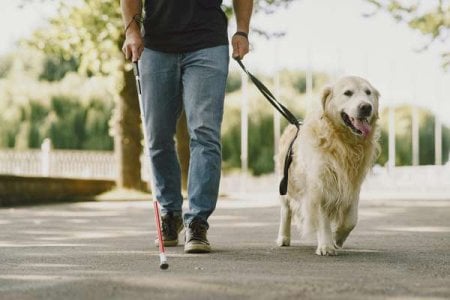Woman sues famous transportation app after series of discriminatory treatment
By
Danielle F.
- Replies 65
Navigating the world has its set of challenges, especially when people have certain conditions.
Many Aussies, especially seniors, understand the importance of reliable transportation, especially when driving is no longer an option.
However, when supposedly accessible services become a barrier themselves, it presents an opportunity for action.
This is the story of Paula Hobley, a Victorian woman who strived for independence and normalcy despite the hurdles of blindness.
Ms Hobley has relied on taxis and rideshare services like Uber to attend medical appointments, meet friends, and complete her shopping.
Ms Hobley signed up for Uber's Service Assistance Programme, which should notify drivers that the traveller has a guide dog during the trip.

However, her pursuit of a simple, stress-free travel experience has been repeatedly thwarted by an unexpected adversary.
Her journey has been marred by a series of refusals from Uber drivers that violated both her rights and Australian law.
'As a person with a disability, I'm not a second-class citizen,' Ms Hobley stated in an interview.
'I have the right to access services in the same way as everyone else.'
Drivers would often tell Ms Hobley to book another service called Uber Pet.
'Uber Pet is for pets. A guide dog is not a pet,' she clarified.
According to the Disability Discrimination Act (1992), it is illegal to refuse service to a person with an assistance animal.
Yet, Ms Hobley faced this discrimination on dozens of occasions, which led her to take a stand by suing Uber in the Federal Court.
Her case highlighted a broader issue that has become endemic, as current policies failed to protect the rights of individuals with disabilities.
Ms Hobley's experiences were not isolated incidents.
According to a survey run by Guide Dogs Australia, nearly half of guide dog handlers had been denied a ride in the past two years.
This widespread problem has been an inconvenience among individuals who require assistance dogs.
In response to Ms Hobley's move, Uber immediately emphasised their commitment to working with stakeholders to prevent such refusals.
The ride-hailing app also reiterated the training and education they continue to provide to their drivers.
Uber explained that they have policies in place that require drivers to comply with laws regarding riders with disabilities, including those with assistance animals.
However, the continued occurrence of these refusals suggested that these measures are not enough.
Ms Hobley's legal battle was beyond her grievances; it's about holding companies accountable and ensuring that the rights of people with disabilities are upheld.
For our readers who may face similar challenges, Ms Hobley's story should be a reminder that you have rights that deserve to be respected.
It's also a call to action for all of us to support efforts to make our society more inclusive and accessible.

What are your thoughts on this issue? Have you or someone you know faced similar challenges with transportation services like Uber? Let's discuss in the comments below and work together to raise awareness and drive change.
Many Aussies, especially seniors, understand the importance of reliable transportation, especially when driving is no longer an option.
However, when supposedly accessible services become a barrier themselves, it presents an opportunity for action.
This is the story of Paula Hobley, a Victorian woman who strived for independence and normalcy despite the hurdles of blindness.
Ms Hobley has relied on taxis and rideshare services like Uber to attend medical appointments, meet friends, and complete her shopping.
Ms Hobley signed up for Uber's Service Assistance Programme, which should notify drivers that the traveller has a guide dog during the trip.

Ms Paula Hobley is blind and heavily relies on her guide dog for navigation. Image Credit: Pexels/Gustavo Fring
However, her pursuit of a simple, stress-free travel experience has been repeatedly thwarted by an unexpected adversary.
Her journey has been marred by a series of refusals from Uber drivers that violated both her rights and Australian law.
'As a person with a disability, I'm not a second-class citizen,' Ms Hobley stated in an interview.
'I have the right to access services in the same way as everyone else.'
Drivers would often tell Ms Hobley to book another service called Uber Pet.
'Uber Pet is for pets. A guide dog is not a pet,' she clarified.
According to the Disability Discrimination Act (1992), it is illegal to refuse service to a person with an assistance animal.
Yet, Ms Hobley faced this discrimination on dozens of occasions, which led her to take a stand by suing Uber in the Federal Court.
Her case highlighted a broader issue that has become endemic, as current policies failed to protect the rights of individuals with disabilities.
Ms Hobley's experiences were not isolated incidents.
According to a survey run by Guide Dogs Australia, nearly half of guide dog handlers had been denied a ride in the past two years.
This widespread problem has been an inconvenience among individuals who require assistance dogs.
In response to Ms Hobley's move, Uber immediately emphasised their commitment to working with stakeholders to prevent such refusals.
The ride-hailing app also reiterated the training and education they continue to provide to their drivers.
Uber explained that they have policies in place that require drivers to comply with laws regarding riders with disabilities, including those with assistance animals.
However, the continued occurrence of these refusals suggested that these measures are not enough.
Ms Hobley's legal battle was beyond her grievances; it's about holding companies accountable and ensuring that the rights of people with disabilities are upheld.
For our readers who may face similar challenges, Ms Hobley's story should be a reminder that you have rights that deserve to be respected.
It's also a call to action for all of us to support efforts to make our society more inclusive and accessible.
Key Takeaways
- A Victorian woman sued the ride-hailing app Uber after allegedly discrimination against her and her guide dog.
- Despite efforts to educate drivers and work with stakeholders, Uber has been unable to prevent service refusals for those with guide dogs.
- A survey from Guide Dogs Australia indicated that nearly 50 per cent of passengers with guide dogs have been denied services in the past two years.
- The case aimed to address the broader issue of disability discrimination in ride-sharing services.







